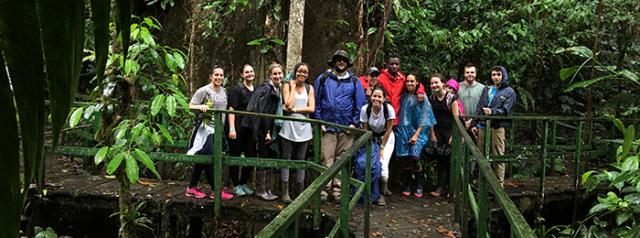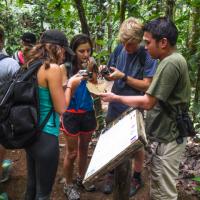The Holbrook Explorer

From the Field: Biology Students Study in Costa Rica
From the Field: Biology Students Study in Costa Rica
Last spring, 13 Eastern Connecticut State University biology students and biology professors Patricia Szczys and Matthew Graham trekked to the rainforest of Costa Rica to experience a 12-day trip they had been preparing for since January. Their base was Selva Verde Lodge and Rainforest Reserve.
The students had spent the spring semester in groups of three and four students each reading scientific literature and preparing research proposals for studies they would conduct in the field while in Costa Rica. During six days in the humid lowland rainforest at Selva Verde, they completed experiments on leaf-cutter ant foraging strategies; predator recognition and avoidance behavior by the strawberry poison-dart frog; effectiveness of aposematic warning colors and patterns in snakes; and population density and sex ratio of the green and black poison-dart frog.
Aside from these projects, the group spent time hiking, observing animals and identifying plants there are part of the rich biodiversity of the tropical rainforest. The group visited the world-renowned La Selva Biological Research Station; toured an organic export-oriented pineapple plantation; hiked the lava fields at Arenal Volcano National Park and then bathed in the park’s hot springs; toured the Don Juan coffee plantation; and hiked to the Continental Divide in the Monteverde Cloud Forest Reserve.
The Tropical Biology course and field trip to Costa Rica is offered in alternating spring semesters and fulfills an upper-level course requirement for Biology majors. This class, along with its sister course, Tropical Biology in San Salvador, Bahamas, continues a tradition in the Biology Department of offering an international field experience in the tropics every year since 1968. Professor Szczys has been leading groups to Costa Rica since it replaced Belize as the terrestrial-focused course in 2008.
Source: Media release by Eastern Connecticut State University

